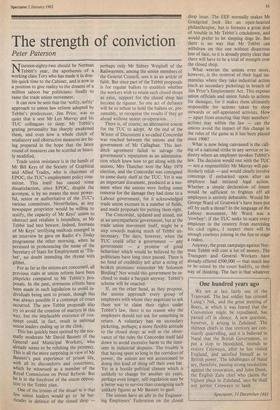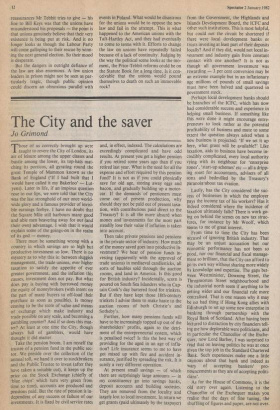The strength of conviction
Peter Paterson
Nineteen-eighty-two should be Norman Tebbit's year, the apotheosis of a working class Tory who has made it in dou- ble quick time to the Cabinet, and is now in a position to give reality to the dreams of a million saloon bar politicians: finally to tame the trade union movement.
It can now be seen that the 'softly, softly' approach to union law reform adopted by Tebbit's predecessor, Jim Prior, was so quiet that it sent Mr Len Murray and his TUC colleagues to sleep. Mr Tebbit's grating personality has sharply awakened them, and even now a whole clutch of retaliatory and obstructive measures are be- ing prepared in the hope that the latest round of measures can be scuttled or heavi- ly modified.
Trade union resistance is in the hands of Mr Bill Keys of the Society of Graphical and Allied Trades, who is chairman of EPOC, the TUC's employment policy com- mittee. This itself has caused some dissatisfaction, since EPOC, despite the acronym, is by no means the most power- ful, senior or authoritative of the TUC's various committees. Nevertheless, as any newspaper proprietor would be willing to testify, the capacity of Mr Keys' union to obstruct and retaliate is boundless, so Mr Tebbit had best beware. Indeed, foretaste of Mr Keys' terrifying methods emerged in an interview he gave on Radio 4's Today programme the other morning, when he persisted in pronouncing the name of the Secretary of State for Employment as `Tib- bet', no doubt intending the rhyme with gibbet.
For as far as the unions are concerned, all previous stabs at union reform have been pinpricks compared to Mr Tebbit's pro- posals. In the past, strenuous efforts have been made in such legislation to avoid in- dividuals being sent to prison, though this was always possible if a contempt of court occurred. The new Tebbit proposals also try to avoid the creation of martyrs in this way, but the implacable existence of con- tempt could, in fact, result in national union leaders ending up in the clink.
This has quickly been spotted by the nor- mally moderate Mr David Basnett of the General and Municipal Workers, who already seems to be relishing the prospect. This is all the more surprising in view of Mr Basnett's past experience of prison life, with all its discomforts and constraints, which he witnessed as a member of the Royal Commission on Penal Reform. But he is in the forefront of the union opposi- tion to the Tebbit plan.
One of the ironies of the situati In is that few union leaders would go to he bar- ricades in defence of the closed shop — perhaps only Mr Sidney Weighell of the Railwaymen, among the senior members of the General Council, sees it as an article of faith. But since part of the Tebbit proposals is for regular ballots to establish whether the workers wish to retain such closed shops as exist, support for the closed shop has become de rigueur. So one act of defiance will be to refuse to hold the ballots or, pre- sumably, to recognise the results if they go ahead without union co-operation.
There is, of course, an alternative course for the TUC to adopt. At the end of the Winter of Discontent a so-called Concordat was reached between the unions and the government of Mr Callaghan. This last- ditch agreement failed to salvage the government's reputation as an administra- tion which knew how to get along with the unions, Mrs Thatcher won the May 1979 election, and the Concordat was consigned to some dusty shelf at the TUC. Yet it was an important document, produced at a mo- ment when the unions were feeling some remorse for the damage they had done to a Labour government, for it acknowledged trade union excesses in a number of fields, and made proposals for putting them right.
The Concordat, updated and aimed, not at an unsympathetic government, but at the trade union movement itself, might be a step towards making much of Tebbit un- necessary. The days, however, when the TUC could offer a government — any government — a promise of good behaviour which would be believed by the politicians have long since passed. There is no fund of credibility left after a string of broken promises: remember Mr Solomon Binding? Nor would this government be in- clined to make a bargain anyway. Tebbit's scheme will be enacted.
If, on the other hand, as they propose, the unions approach every group of employers with whom they negotiate to ask them not to claim their rights under Tebbit's law, there is no reason why the employers should not ask for something in return. A voluntary ban on secondary picketing, perhaps; a more flexible attitude to the closed shop; as well as the obser- vance of the rules the Concordat itself laid down to avoid excessive harm to the inno- cent in industrial disputes. The trouble is that having spent so long in the corridors of power, the unions are not accustomed to doing this kind of thing off their own bat. Yet in a hostile political climate which is unlikely to change for another six years, perhaps even longer, self-regulation may be a better way to survive than consigning such unlikely figures as Mr Basnett to gaol.
The unions have an ally in the Engineer- ing Employers' Federation on the closed shop issue. The EEF normally makes Mr Gradgrind look like an open-hearted philanthropist, but is foresees a great deal of trouble in Mr Tebbit's crackdown, and would prefer to let sleeping dogs lie. But there is no way that Mr Tebbit can withdraw on this one without disastrous loss of face, so it is already pretty clear that there will have to be a trial of strength over the closed shop.
What worries the unions even more, however, is the removal of their legal im- munities where they take industrial action (such as secondary picketing) in breach of Jim Prior's Employment Act. This exposes union officials and union funds to actions for damages, for it makes them ultimately responsible for actions taken by shop stewards or self-appointed activists. How — apart from ensuring that their members' actions stay within the law — can the unions avoid the impact of this change in the rules of the game as it has been played .since 1906?
What is now being canvassed is the call- ing of a national strike in any service or in- dustry where an employer invokes Tebbit's law. The decision would rest with the TUC — not a responsibility Mr Murray will par- ticularly relish — and would clearly involve contempt if embarked upon after an employer had initiated legal action. Whether a simple declaration of intent would be sufficient to frighten off all employers is entirely debatable. Would Mr George Ward of Grunwick's have been put off by such a threat? In the language of the Labour movement, Mr Ward was a `cowboy': if the TUC seeks to scare every employer in the country from exercising his civil rights, I suspect there will be enough cowboys joining in the fun to stage a rodeo.
Anyway, the great campaign against Nor- man Tebbit will cost a lot of money. The Transport and General Workers have already offered £500,000 — that much less to be seized by the court bailiffs, to their way of thinking. The fact is that whatever reassurances Mr Tebbit tries to give — his line to Bill Keys was that the unions have misunderstood his proposals — the point is that unions genuinely believe that their very existence is being put at risk. And it no longer looks as though the Labour Party will come galloping to their rescue by winn- ing the next general election. So their mood is desperate.
But the dangers in outright defiance of the law are also enormous. A few union leaders in prison might not be seen as par- ticularly tragic, though public opinion could discern an obnoxious parallel with events in Poland. What would be disastrous for the unions would be to oppose the new law and fail in the attempt. This is what happened to the American unions with the Taft-Hartley Act, and they had eventually to come to terms with it. Efforts to change the law on unions have repeatedly failed because of a lack of continuity. Judging by the way the political scene looks at the mo- ment, the Prior-Tebbit reforms could be on the Statute Book for a long time. Is it con- ceivable that the unions would pound themselves to death on such an immovable rock?



































 Previous page
Previous page